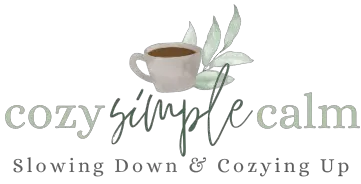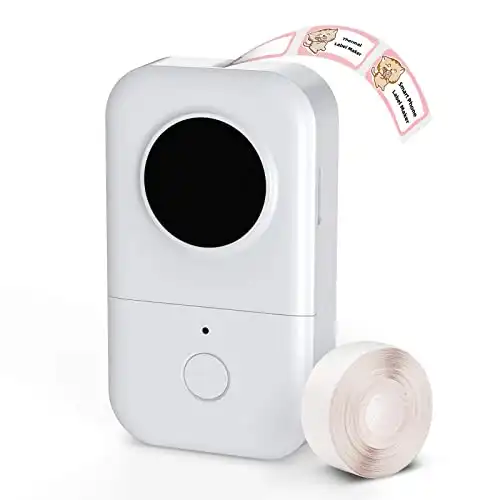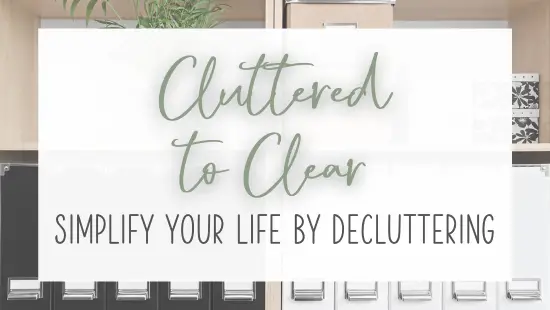
Note - Affiliate links may be used in this post, including Amazon affiliate links. I may receive a small commission at no extra cost to you if you use my affiliate link. But don't worry, all the opinions expressed are my own!
Cluttered to clear: Simplify your life by decluttering
Take your home from cluttered to clear
Decluttering can seem like a daunting task, but it’s a great way to simplify your life. By getting rid of the things you don’t need or use, you’ll free up space and energy for the things that matter most. Read on for tips on how to take your home from cluttered to clear!
What is clutter?
Most of us have experienced the feeling of being overwhelmed by clutter. Whether it’s a messy desk, a cramped closet, or a stack of unread books, clutter can make us feel stressed and out of control. But what exactly is clutter?
Clutter is anything that creates physical or mental chaos in your life. It’s all the stuff that fills up your home and mind, making it difficult to relax or be productive.
In simple terms, clutter is anything that we don’t need, don’t use regularly, or that doesn’t have a home when it’s not in use. It can be physical (like clothes, papers, or toys) or mental (like negative thoughts or worries). Too much clutter can be overwhelming and cause us to feel bogged down. It can also make it difficult to find things we need, enjoy our space, or focus on what’s important. Luckily, there are some simple ways to reduce clutter and regain control of our lives. By taking the time to declutter, we can simplify our living areas and enjoy a more peaceful home.
How are cleaning and decluttering different?
Many people use the terms “cleaning” and “decluttering” interchangeably, but they are actually two very different activities. Cleaning is all about removing dirt, dust, and other debris from surfaces – getting things CLEAN. It’s a necessary (and seeming never-ending) chore that helps to keep our homes clean and healthy.
On the other hand, decluttering is about getting rid of unwanted or unused items and making a dedicated space for the things we keep. It’s a way to simplify our lives, to create more peace and order in our homes. While decluttering can be therapeutic (oh, boy, can it ever!), it’s not necessarily a deep-cleaning activity. In fact, you can declutter your home without ever picking up a cleaning product.
Why is my house always cluttered?
Clutter happens. But one of the keys to taming those piles is figuring out WHY it happens. Here are a few reasons to consider:
We hold onto things because we think we might need them *someday*
But, do we really need them? Or are we just unsure of letting them go? Maybe we don’t want to admit that we don’t need them. Whatever the reason, holding onto things can give us a false sense of security – but at what cost?
We don’t have a system for organizing our things
Having a cluttered house is very often the result of not having systems to organize our belongings. Without knowing where things go, it’s easy to throw everything into a pile or stack it onto a shelf. And those piles tend to multiply like rabbits!
We don’t make time to declutter regularly
Decluttering takes time and energy, so it’s often easy to put off. However, if we don’t take the time to declutter regularly, our homes can quickly become chaotic.
Our homes are too small for all our stuff
Sometimes, it’s as simple as just having too much stuff crammed into our homes. If we don’t have enough space for everything we own, our homes will inevitably feel cluttered and overflowing.
It might be one or all of these reasons, but whatever the reason, clutter is a solvable problem with just a little effort and planning.
How can decluttering help me?
That clutter doesn’t just fill up your space; it also fills up your mind.
A cluttered home can be a source of stress, anxiety, and even depression. It can make us feel like we’re not good enough, that we cannot keep our lives in order.
But decluttering can help change all that. Some of the benefits of decluttering your home include:
Saving money
When we declutter our homes, we get rid of things we don’t need or use. This means we’re less likely to make impulse purchases or buy things we don’t really need (or already have somewhere but can’t find – like those scissors under the pile of unopened mail from last month). In the long run, this can help us save money and waste less.
Reduced stress and anxiety
When my home is cluttered, I turn into one big stress ball. It can be difficult to relax or feel at ease when we’re constantly surrounded by mess. But by decluttering, we can reclaim control of our space and lives.
Better organization and efficiency
When a physical space is cluttered and disorganized, it’s a challenge to be efficient or productive. But, when we declutter, we can create systems for organizing our belongings and streamlining our day-to-day tasks. In this way, decluttering can help us stay organized, get more done in less time, and use our energy for more fun things.
It can make our homes more inviting.
A cluttered and chaotic home isn’t the most welcoming. But, when we take the time to declutter, we can create soothing spaces that feel calm and comfortable. And when we come home to such a relaxing environment, it’s easier to unwind after a long day of work or school.
A mood and creativity boost.
Clutter has been shown to have a negative effect on our mood and creativity. It can be difficult to focus or feel inspired when we’re surrounded by mess. But, when we declutter our living spaces, we can improve our mood and increase our creativity.
So, how do you clear a cluttered home?
It can feel overwhelming if you just stand there and look at the mess. But, if you take it one step at a time, you’ll be surprised at how quickly you can declutter your home. Here are some tips to get you started:
Start with a plan
The first step to decluttering is to make a plan. What are your goals? What do you want to accomplish? What areas of your home need the most attention? Once you have a general idea of what you want to do, you can start making a list of specific tasks.
Start small
Don’t try to declutter your entire house in one day! It can be overwhelming to tackle a cluttered house all at once, so start small. Decide which space or one room you want to focus on first and devote some time each day to decluttering that area.
Set aside some time
Decluttering takes time and energy, so you’ll need to set aside some dedicated hours to get the job done. Whether it’s an hour a day for a few weeks or a whole weekend of cleaning, make sure that you have enough time for the task at hand.
Get rid of the easy stuff first
When you’re ready to start decluttering, it’s often best to begin with the easy stuff. This might include items you no longer use or need or things that can be quickly and easily tossed in the trash. Once you’ve tackled the easy stuff, you can move on to the more difficult tasks.
Group your items
To keep things organized and efficient, try to group together similar items in categories to declutter whenever possible. For example, if you’re decluttering your kitchen, put all the appliances in one pile, the dishes in another, anything that should be in a different room in another, and so on. This can help make the process easier and more streamlined.
Create a system
One of the keys to maintaining a clean and organized clutter-free home is to create a system for keeping things in order. This might mean creating baskets or bins for sorting clutter, setting up shelves or racks for storage space, or creating a routine that works best for your family. Whatever method you choose, it’s important to stick with it so that your home doesn’t become cluttered again.
Make decluttering a regular habit
The best tip for keeping your cluttered home under control is to make decluttering a regular part of your routine. Set aside some time each week or month to go through those spaces that tend to collect clutter, sort out the things you no longer need, and create systems for keeping your house organized. With practice and consistency, you can maintain a clear, clutter-free home.
Practical tips for tackling clutter
Again, don’t try to do your entire home in one day – break it up into rooms or areas
- Start with the easiest area to declutter. This will help you get into the groove and motivate you to keep going.
- Start with a clean slate. This means taking everything (except the furniture) out of a room or space and starting from scratch. It might seem intimidating, but it’s actually very therapeutic. Plus, it’ll give you a chance to really evaluate what you need and don’t need in that space.
- Make three main piles: One for things to keep, one for things to donate, and one for things to throw away. Once you have the donate and throw away items out of the way, it will be much easier to visualize what will stay and where it will go.
- Take your time and be ruthless when sorting through your belongings. If you haven’t used it in the past year, chances are you don’t need it.
- Once you know what needs to stay, develop a system to store and organize your things. This might include using baskets, bins, or shelves.
- Label your storage spaces clearly so you can find things quickly and easily. Label makers are perfect for keeping the things you don’t use every day “findable” when you do need them.
- Finally, celebrate your accomplishments! Once you’ve decluttered an area, take a few minutes to enjoy your newfound space.
How to declutter quickly
Clutter emergency! Unexpected guests have just called, they’re on their way, and you can’t even see the kitchen table!
This isn’t a long-term solution, but life happens. So if you need to do some decluttering in a hurry, here’s a step-by-step guide to getting things presentable…fast.
Step 1 – Spend your time on the areas you’ll actually be using
This is no time to worry about the attic or the storage closet in the spare room. Instead, focus on the rooms and areas that you’ll actually use. That may be the living room, kitchen, dining room, or guest bedroom. Work on the visible areas; you can work on the cabinets and closets another time. (If you need it, you have my permission to save those for another, less time-crunched day.)
Step 2 – Tackle the problem spots first
Take a good look around and identify any particularly cluttered areas. Once you’ve identified these areas, focus your attention on them and start clearing out the clutter. Focus on one place at a time and systematically work your way through the room.
Step 3 – Have a storage bin and a trash bag ready and get to work!
Make sure you have a trash bag and a storage bin or box handy. Use the trash bag to get rid of obvious items you no longer need. Use the storage bin or box for things that currently don’t have a home but don’t belong *there*. Save that bin for another day; right now, keep your focus.
Step 4 – Relax and enjoy your guests!
Once you’ve decluttered as much as you can, take a step back and enjoy your newly organized space!
By following these simple tips, you’ll be able to declutter your space in any clutter emergency.
Quotes about decluttering
“Clutter is not just physical stuff. It’s old ideas, toxic relationships, and bad habits. Clutter is anything that does not support your better self.”
~Eleanor Brown
“The things you own end up owning you.”
~Chuck Palahniuk
“Instead of thinking I am losing something when I clear clutter, I dwell on what I might gain.”
~Lisa J. Shultz
“Most people do not need more space, they need less stuff.”
~Michelle Ogundehin
“The less stuff you have, the less clutter you have, the less stressed you are.”
~Maxime Lagacé
“Clearing clutter—be it physical, mental, emotional, or spiritual—brings about ease and inspires a sense of peace, calm, and tranquility.”
~Laurie Buchanan, PhD
“Just because something belongs to you doesn’t mean you should keep it for the rest of your life. Things are meant to be transitory.”
~Susan Wright
“The best way to find out what we really need is to get rid of what we don’t.”
~Marie Kondō
Now, clear out that clutter
Whether you prefer quick fixes or a more systematic approach, it’s important to find the best strategy for you. Remember to be ruthless in your decision-making, focus on one area at a time, and take the time to enjoy your newfound space. With these tips, you can declutter your home, simplify your life, and enjoy the benefits of a more organized lifestyle!
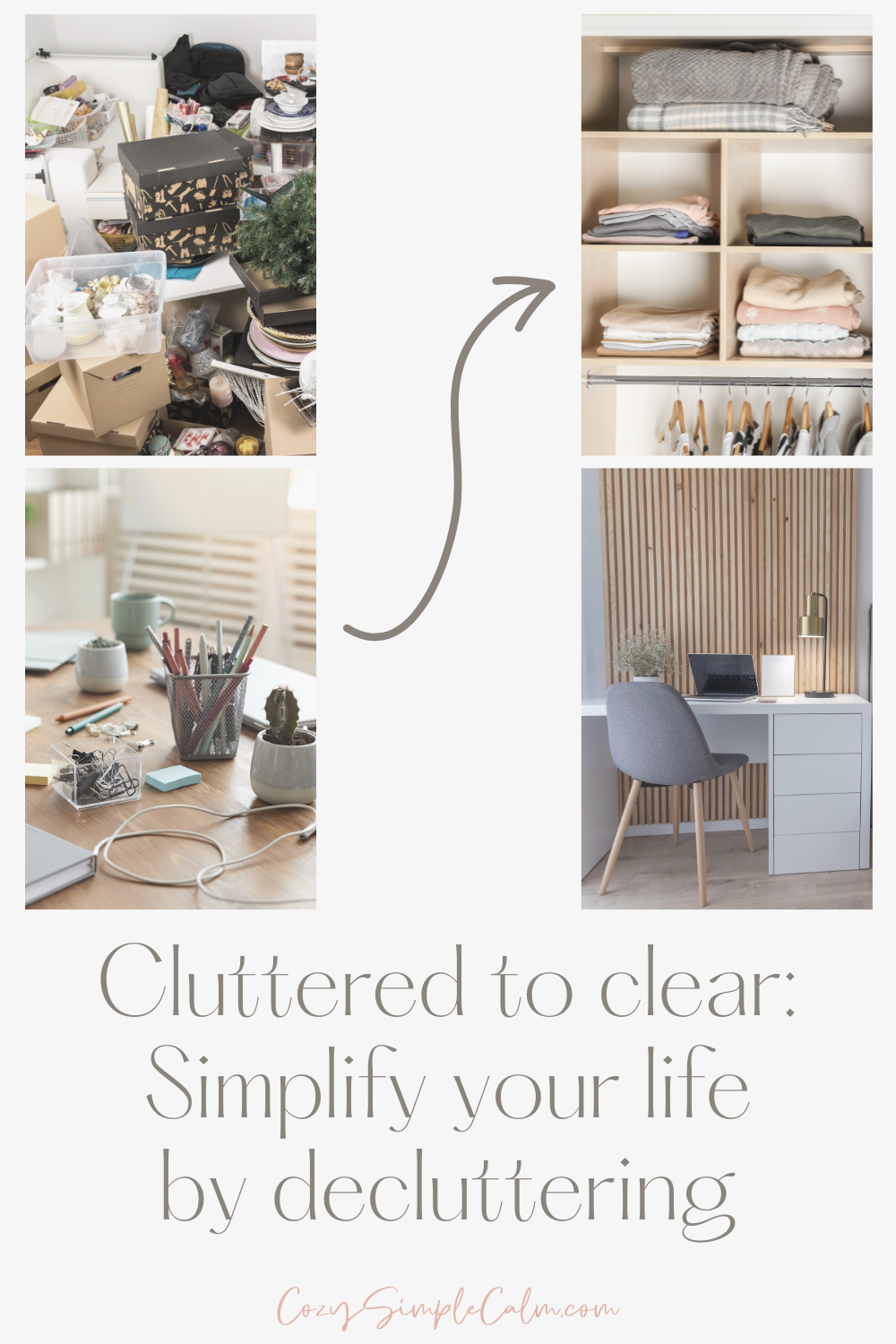
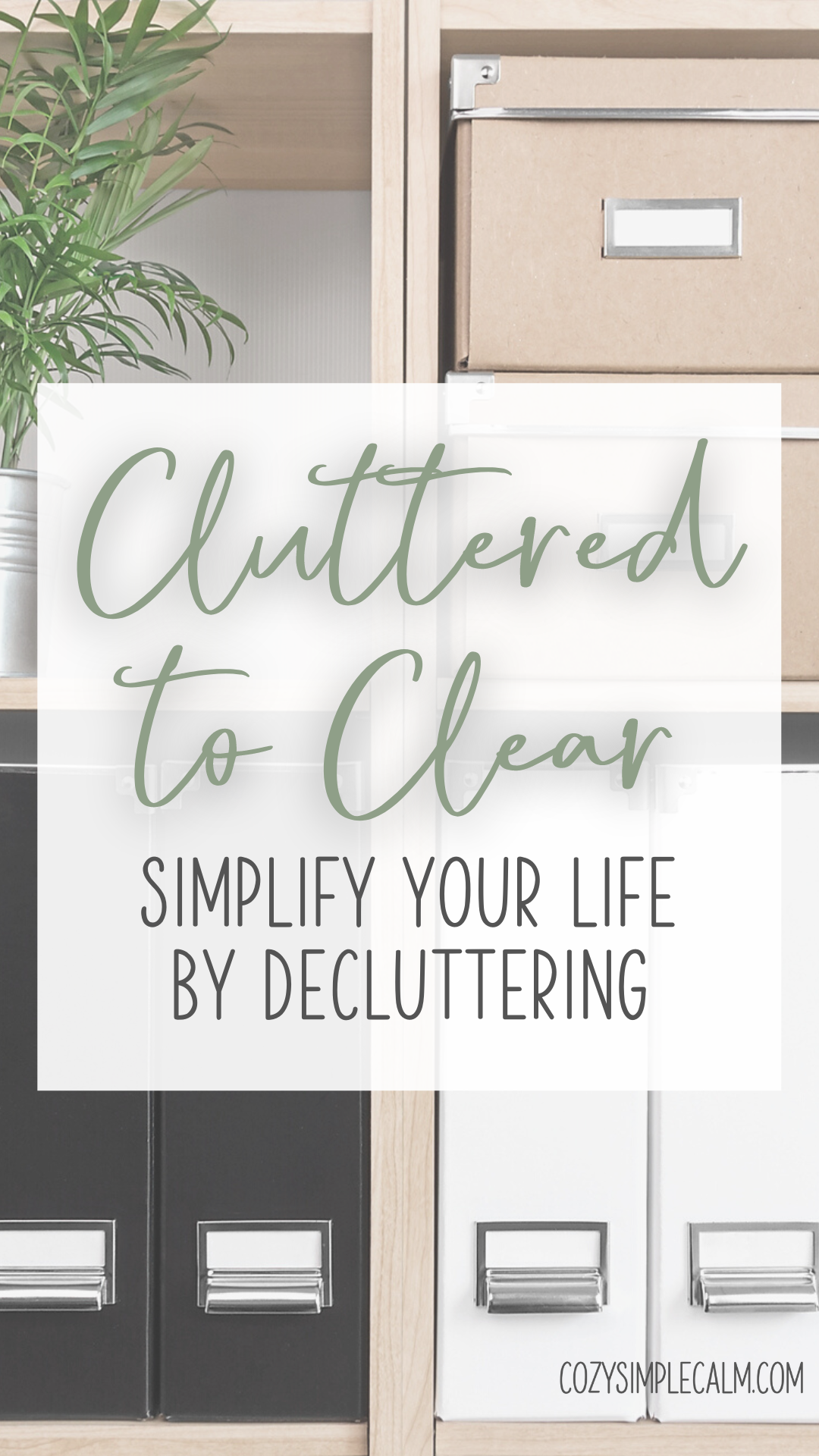
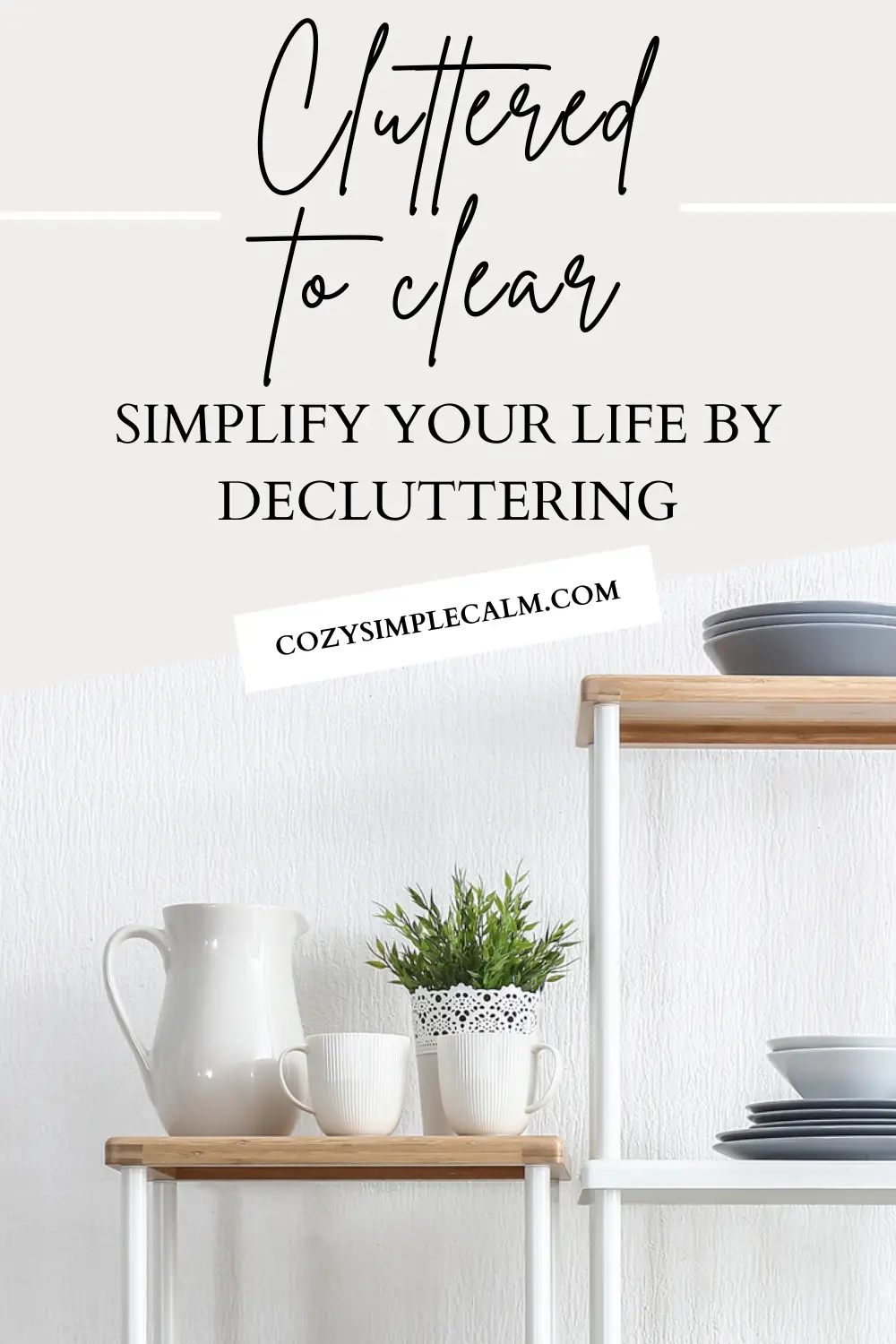
Posted in Simplifying life Uncategorized
Tagged decluttering organization reducing stress simplify simplifying life
